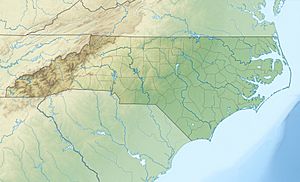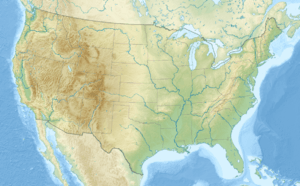Grassy Creek (Deep River tributary) facts for kids
Quick facts for kids Grassy Creek |
|
|---|---|
|
Location of Grassy Creek mouth
|
|
| Other name(s) | Tributary to Deep River |
| Country | United States |
| State | North Carolina |
| County | Moore |
| Physical characteristics | |
| Main source | Reedy Creek divide about 0.25 miles northeast of Westmoore School 542 ft (165 m) 35°29′26″N 079°40′22″W / 35.49056°N 79.67278°W |
| River mouth | Deep River about 3 miles west of High Falls, North Carolina 312 ft (95 m) 35°29′22″N 079°34′46″W / 35.48944°N 79.57944°W |
| Length | 7.56 mi (12.17 km) |
| Basin features | |
| Progression | east |
| River system | Deep River |
| Basin size | 12.57 square miles (32.6 km2) |
| Tributaries |
|
| Bridges | Needham Grove Road, Smyrna Church Road, N Howard Mill Road, Reynolds Mill Road |
Grassy Creek is a small river, or "creek," located in Moore County, North Carolina, in the United States. It's about 7.56 miles (12.17 km) long and flows into a bigger river called the Deep River. Think of it as a smaller stream that feeds into a larger one!
Contents
Where Grassy Creek Flows
Grassy Creek begins in Moore County, North Carolina. Its starting point is about 0.25 miles (0.40 km) northeast of Westmoore School. From there, the creek flows generally towards the east.
Journey to Deep River
After its journey, Grassy Creek joins the Deep River. This meeting point is about 3 miles (4.8 km) west of a town called High Falls, North Carolina. The creek drops about 230 feet (70 meters) from its source to where it meets the Deep River.
Crossing the Creek
Several roads have bridges that cross over Grassy Creek. These include Needham Grove Road, Smyrna Church Road, N Howard Mill Road, and Reynolds Mill Road.
Grassy Creek's Surroundings
The area that Grassy Creek drains, known as its watershed, covers about 12.57 square miles (32.55 square kilometers). This means all the rain that falls in this area eventually flows into Grassy Creek.
Weather and Nature
The region around Grassy Creek gets a good amount of rain, about 47.6 inches (121 cm) each year. A large part of the watershed, about 54%, is covered by forests. These forests are important for keeping the water clean and providing homes for wildlife.
 | Shirley Ann Jackson |
 | Garett Morgan |
 | J. Ernest Wilkins Jr. |
 | Elijah McCoy |



